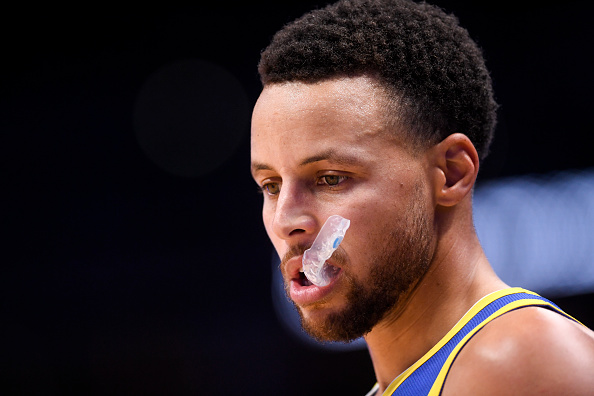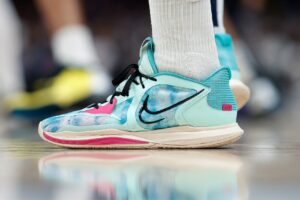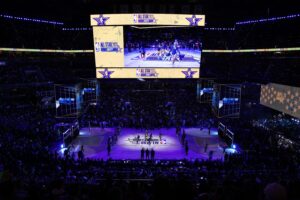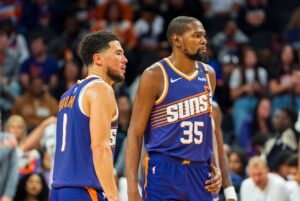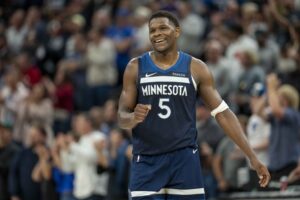The Golden State Warriors beat Dallas in just five games and will return to the NBA Finals. The final series in the Western side of the playoff bracket was slightly anti-climactic, but the participants are certainly worth celebrating.
Both teams should take great pride in their performances. The Mavericks had to overcome Luka Dončić’s calf strain to top Utah and were definitive underdogs against Phoenix in the second round. The organization has more proof that Dončić is a generational playoff performer, and Jalen Brunson bounced back from being benched in the playoffs last year to performing like a true secondary scoring option. They discovered an identity by benching center Dwight Powell and playing small, giving Dončić spacing and the team speed and length in maintaining their strong defense.
The Warriors beat Dallas after putting away Denver and Memphis, and have played exceptionally well to get to this point. Golden State has had no chemistry issues despite never having their full complement of players healthy during the regular season. Stephen Curry returned from a foot injury and was just named the first-ever Conference Finals MVP. They’ve used their ball-movement offense and the transcendent play of to take down superstars in Nikola Jokić, Ja Morant, and Dončić. What else can we learn from the series, and what lies ahead for each team?
Golden State Warriors Beat the Dallas Mavericks and Return to NBA Finals
Series takeaways for the Warriors
Now that the Warriors beat Dallas, it’s appropriate to appreciate how Golden State got to this moment. Curry, Draymond Green, Klay Thompson, Kevon Looney, and Damion Lee are the only players left from the 2019 Finals. Warriors GM Bob Myers and co. supplemented the core by swapping D’Angelo Russell for Andrew Wiggins and the draft pick that became Jonathan Kuminga. Jordan Poole was the 28th pick in the 2019 draft and has become a key contributor. With Curry, Thompson, and Green all over 30, the team needed to find younger contributors to extend their run, and the front office succeeded.
The Warriors beat Dallas because of their defense. They were able to effectively guard Dončić while limiting open threes by Dallas’ shooters. Golden State primarily used a show-and-recover screen in the pick-and-roll. Curry started guarding Reggie Bullock, who would set a screen on Dončić’s man, usually Wiggins, then flare to the three-point line. Curry slid to meet Dončić and allowed Wiggins to recover to Dončić before scrambling to his original cover. When Bullock roasted the Warriors with open threes in Game 2, Curry guarded Dorian Finney-Smith the rest of the series. Finney-Smith is less adept at shooting threes on the move, and couldn’t make the Warriors pay for the hedge-and-recover scheme. The Warriors’ 1-2-2 zone provided a change of pace and gave Luka another scheme to solve.
Offensively, the Warriors counted on Curry and balanced contributions to overcome Dallas. Curry earned his MVP by averaging nearly 24 points per game and increased his three-point percentage to just under 44%. Curry actually decreased his turnovers as well, from 3.2 a game in the regular season to 2.6 in this series. Wiggins deserves special recognition for recognizing his mismatch with Dončić guarding him and repeatedly attacking throughout the series.
Series takeaways for the Mavericks
The way the Warriors beat Dallas makes it clear there was a talent gap between the two teams. This season, the Warriors won 53 games despite Curry, Thompson, and Green playing one full game together. With Golden State missing only Gary Payton II and Andre Iguodala, Dallas could not keep up.
There are plenty of positives for Dallas to take away from the series, though. Dončić continues to show his offensive peers are league legends, not modern players. The Warriors had to go to the show-and-recover scheme detailed above to defend him, which they previously used in playoff series against LeBron James and James Harden. Dončić managed to average 32 points per game against the Warriors, but converted just 41.5% of his shots and handed out 2.7 fewer assists per game than in the regular season. Still, Dončić has only lost in the playoffs to a Clippers team with Kawhi Leonard, Paul George, and Patrick Beverley, and the three-time NBA champion Warriors. He might already be the best postseason offensive player in the NBA. Jalen Brunson was effective and earned the respect of drawing Green as his primary defender.
Once the ball was out of Dončić and Brunson’s hands, though, the Mavericks proved easy to defend. Spencer Dinwiddie was inconsistent, and the other Mavs needed to be set up to score consistently. The Warriors’ offense had the Mavericks muddled on defense. They lacked a defender to guard Curry one-on-one, and Golden State found ways to leverage Dallas’ help into layups and dunks. Dallas played without a center most of this series, and features point guards who are either 6’8” (Dončić) or blessed with burly strength (Brunson). It makes sense for Dallas to spend the next regular season practicing a switch-everything scheme.
Next steps for the Warriors
Golden State now waits for Boston or Miami to emerge as their next opponent. Either team would be the toughest test the Warriors have faced in the postseason, with respect to the Mavericks. The game plan the Warriors beat Dallas with will have to change. Both teams are defined by the presence of All-Star caliber wings who play both ends of the court, and Golden State hasn’t faced any players like Jimmy Butler or Jayson Tatum during this postseason run.
The Celtics and the Heat are capable of shutting down the Warriors’ offense as defense-first squads. Both teams feature switch-heavy approaches, intelligent personnel, and multiple options to guard Curry and Poole. Miami is forcing the third-most turnovers this postseason at 15.5 a game, and giveaways are the Warriors’ Achilles heel. Boston’s overall positional size makes them a very challenging matchup. They held the Warriors to 25 points with 4:30 left in the second quarter of their March 16th matchup before Curry exited the game with the foot injury that kept him out until the playoffs.
Since the Warriors won’t be able to score as easily in the Finals no matter the opponent, their defense will be incredibly important. Green has seen his impact wax and wane, but he will need to play to his Defensive Player of the Year apex for the Warriors to have a chance. Wiggins will need to hold up as the primary defender on Tatum or Butler. Expect to see more of the 1-2-2 zone. Rebounding will be key for Golden State as well; they’ve only been out-rebounded three times in the previous two rounds. Cleaning the glass is how the Warriors beat Dallas, and it’s how they could win the Finals.
Next steps for the Mavericks
The future became the present for the Mavericks even before the Warriors beat Dallas. They have a generational superstar in Dončić, and the organization has built a perennial playoff team around him. However, this series shows Dallas isn’t a true championship contender just yet. New GM Nico Harrison begins year two of the job, and the trade sending out Kristaps Porziņģis for Dinwiddie and Dāvis Bertāns figures to only be step one.
A quick look at Dallas’ Spotrac page shows a tight financial situation. Dallas will be in the luxury tax next season assuming Maxi Kleber’s contract is guaranteed for 2022-2023. He’s a vital part of their five-out lineup, so Kleber is likely returning. That tax estimate does not include resigning Brunson, their second-best player this year and only reliable source of offense aside from Dončić. Brunson will likely be targeted by point guard-needy teams like the Knicks and Pistons. If Dallas doesn’t keep Brunson, they’ll have a huge hole in their roster with no real means to replace him financially. If Dallas keeps Brunson, they’ll have limited ways to improve their roster for the foreseeable future. The Mavericks might need to trade players in the future to reduce their luxury tax payments.
Dallas can use the taxpayer mid-level exception (estimated at ~$6.3 million) for roster upgrades, and they have a trade exception for under $11 million after dealing Josh Richardson to Boston last offseason. Using just one of those tools gives Dallas a towering luxury tax bill for next season. However, not improving the team could leave Dončić as the next superstar with wandering eyes, looking for his next location.


